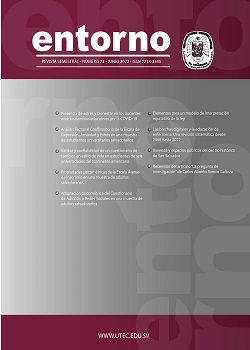Wellness and stress in faculty members in view of the educational changes due to COVID-19
DOI:
https://doi.org/10.5377/entorno.v1i73.14613Keywords:
Stress (Psycology), Stressor, Anxiety- Psychological aspects, Basic education teachers – Behavior (psychology), Middle school teacher, Endemic diseases – El Salvador – Psychological aspects, Educational innovationsAbstract
The spread of the pandemic because of COVID-19 has brought a change in the environment of Salvadorean faculty members at different levels. The objective of this research was to identify the stressors in faculty members based on the teaching modalities that arose from the academic context in 2021. This is a quantitative, transversal and descriptive study. A total of 989 Salvadorean teachers and professors participated in it. They represented primary, secondary, high school and university levels. The Teachers’ stressors in Times of Pandemic Scale (Escala de Estresores Docentes en Tiempos de Pandemia) was used to conduct this study. This scale was elaborated by Oro´s et al (2020), and it consists of 21 items which explore five different factors: Work overload, institutional organization, the Use of new technologies, uncertainty due to the pandemic, and the teacher-student relationship/ rapport plus conflict and teacher´s role. Cronbach´s Alpha was .90. The five factors showed indexes between .86 and .89. An intentional sampling was applied and it was distributed by the teaching networks. Anova was used to compare medians. The second scale applied was Freinburg´s Mindfulness Inventory (FMI-14) in its abbreviated version, and as adapted by Pérez-Verduzco & Laca-Arocena (2017). This subjective wellness scale consisted of 14 items which showed in the general scale a one-dimension structure of mindfulness, with a Cronbach’s Alpha of .85 in its final sample. University professors showed less work overload, a better work environment and organization. Uncertainty and technology represent bigger stressors for teachers at the primary level. Gender differences affect women more. It was concluded that online learning reduces the stressors in the faculty members. There is a higher level of mindfulness amongst those teachers who have been exposed to the virtual modality in its full sense.
Downloads
734
Downloads
Published
How to Cite
Issue
Section
License
Copyright (c) 2022 Universidad Tecnológica de El Salvador

This work is licensed under a Creative Commons Attribution-NonCommercial-ShareAlike 4.0 International License.
© Entorno
It is required that the authors transfer the right of re-production of their articles to the Entorno Journal

